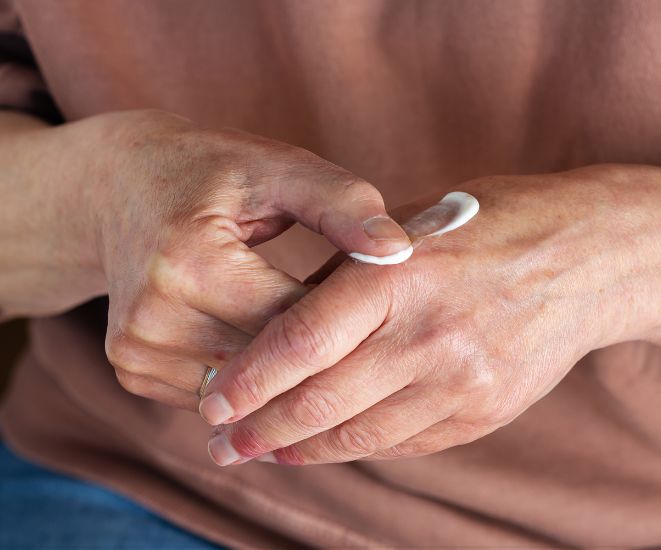Red, Itchy and Irritated
Understanding the signs of an eczema rash can help you manage it early on and get relief sooner.
Eczema Rash Signs
1. Itchy Skin
One of the main signs of eczema is itching. The itch can be mild or intense, and it often gets worse at night. Scratching can make the skin red and cause it to become inflamed.
2. Red or Brown Patches
Eczema often shows up as red, brown or gray patches on the skin. These patches can appear anywhere, but they are most common on the hands, feet, neck and face. In children, eczema patches may also appear on the inside of elbows and behind the knees.
3. Dry, Sensitive Skin
People with eczema tend to have very dry and sensitive skin. The skin may feel rough or scaly, especially in areas with an eczema rash. Dryness makes the skin more likely to crack or bleed, especially when scratched.
4. Small Bumps
Eczema can cause small, raised bumps on the skin. These bumps may become filled with fluid and can leak if scratched. Over time, they may harden or crust over, leading to more irritation.
5. Thickened Skin
When eczema is not treated, the affected skin can become thick and leathery. This thickening is called "lichenification" and happens because of repeated scratching and rubbing. Thickened skin can be harder to treat, so it’s important to address eczema early.
6. Swelling and Warmth
Sometimes, an eczema rash can cause the skin to become swollen and feel warm to the touch. This is due to inflammation under the skin. Swelling and warmth may also increase the feeling of itchiness.
7. Cracks or Open Sores
In severe cases, eczema can cause cracks in the skin or open sores. This happens because the skin barrier is weak, making it easier for bacteria to enter and cause infections. Cracks and open sores can be painful and should be treated by a doctor.
Treatments for Eczema
There are many ways to manage and treat eczema symptoms. Here are some options that can help:
- Moisturize daily: Using a gentle, fragrance-free moisturizer can help keep your skin hydrated. Moisturize after showering or washing your hands to lock in moisture.
- Avoid triggers: Many things can trigger eczema, like certain fabrics, soaps or allergens. Try to identify and avoid anything that makes your eczema worse.
- Use over-the-counter creams: Hydrocortisone creams can help reduce inflammation and itching. Be sure to follow the directions and only use them as needed.
- Take warm baths: Short, warm baths with oatmeal or baking soda can soothe itchy skin. After bathing, pat the skin dry and apply moisturizer.
- Wear soft clothing: Wearing cotton clothing can reduce skin irritation. Avoid wool and other rough fabrics that may make itching worse.
- Try prescription medications: In some cases, doctors may prescribe stronger medications, like corticosteroids or antibiotics if there is an infection. Newer options like topical immunomodulators can also help reduce symptoms.
- Light therapy: For severe eczema, some people find relief with light therapy (also called phototherapy). This treatment uses ultraviolet light to reduce inflammation and itching.
- Manage stress: Stress can make eczema worse, so finding ways to relax can be helpful. Deep breathing, meditation or yoga can reduce stress levels.
Eczema Rash 101
Eczema can be uncomfortable, but with the right treatments, you can find relief and reduce flare-ups. If you think you have eczema or if your symptoms get worse, talk to a doctor for guidance on the best treatment plan for you.
Read on to learn more about the signs of COPD.
